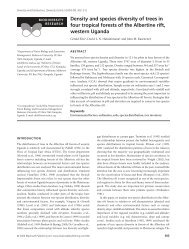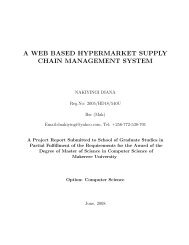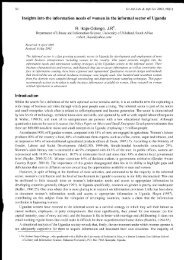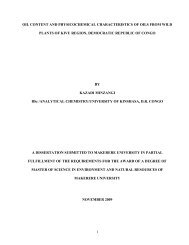THE UNIVERSITY OF LEIPZIG
THE UNIVERSITY OF LEIPZIG
THE UNIVERSITY OF LEIPZIG
You also want an ePaper? Increase the reach of your titles
YUMPU automatically turns print PDFs into web optimized ePapers that Google loves.
ureaucracies tends to increase transaction costs and the rigid, centralised attempts to manage<br />
forest ecosystems often lead to their collapse. 708 Worse still, like in many tropical resourced<br />
countries of Africa, the decentralised system of resource management in Kenya has been held<br />
hostage by the dominant forces of elite capture. The political and economic conditions in<br />
Kenya are not supportive of local conservation and sustainable development initiatives,<br />
making progressive reserve management all the more challenging at the regional and local<br />
level.<br />
The issues pointed out at the national level are an indication of the fundamental and difficult<br />
challenges that exist at the sub-national/regional level. Like we have earlier pointed out, there<br />
are several institutional weaknesses at the regional level which are hindering local<br />
participation and effective reserve management in Kakamega. All institutions and agencies<br />
involved in the planning and management of Kakamega forest reserve located at the city<br />
centre, in Nairobi. The relationships between the institutions and enforcement agencies<br />
involved in the management of this reserve, and the relations between institutions working on<br />
environment-development related issues, are weak. The key respondents in charge of these<br />
institutions at the regional level intimated about the general lack of communication,<br />
information sharing, co-ordination, and collaboration between institutions. This has not only<br />
added to the already existing institution inefficiencies in planning for the Kakemega forest<br />
management, but has also led to conflicts between institutional agencies. In addition, it was<br />
evident that there exists an imbalance in power between certain institutions, particularly<br />
between state and non-state at the regional level and those at the national and local levels,<br />
further affecting relationships and decision-making. Perhaps the greatest hindrance to local<br />
participation and sustainable reserve management from the regional level has come from what<br />
Rosendo and Brown call ‘problems of fit’, both within and between institutions. 709<br />
It is often assumed that institutions and actors are involved in strategic alliances and coalitions<br />
have mutual interests and goals. However, in real practice they may only be a limited mutual<br />
means of achieving quite different objectives. These same variations and difference have been<br />
particularly noticeable in the goals, that is to say: national conservation and aid/developmentoriented<br />
priorities on one hand and visions- that is short-term versus long-term thinking and<br />
planning between institutions on the other. 710 Perhaps the most controversial “problems of fit”<br />
that exist between actors has been the opinionated differences regarding formal resource<br />
entitlements such as property rights being given to the communities within the Kakamega<br />
Forest Reserve, and the degree to which the local communities should be allowed to take part<br />
in the decision-making regarding the management of reserve. These institutional weaknesses<br />
Manchester University Press.<br />
707<br />
Hitchcock, R.K. 2005. Centralisation, Resource Depletion and Coercive Conservation among the Tyua of<br />
Northern Karahari. Human Ecology 23(2):169-198.<br />
708<br />
Holling, C. S. 1995. What barriers? What bridges? . In Barriers and Bridges to the Renewal of Ecosystems<br />
and Institutions. Edited by C. S, Holling, 14-16. New York: Columbia University Press.<br />
709<br />
Brown, K. and S. Rosendo. 1998. The Institutional Architecture of Extractive Reserves in Rondonia, Brazil.<br />
Norwich, U.K: CSERGE.<br />
710<br />
Ascher, W. 1995. Communities and Sustainable Forestry in Developing Countries. San Francisco, CA: ICS<br />
Press.<br />
194






